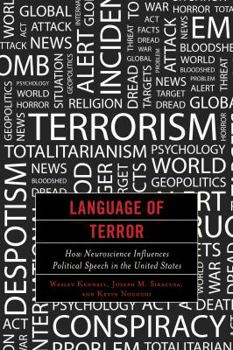Language of Terror: How Neuroscience Influences Political Speech in the United States
The authors examine how the human brain reacts to expressions of political ideology regarding terrorism. By comparing a variety of case studies, they demonstrate how similar acts accompanied by starkly different political language can create cognitive dissonance in the minds of the electorate and influence policy choices.
Format:Hardcover
Language:English
ISBN:1442235829
ISBN13:9781442235823
Release Date:March 2015
Publisher:Globe Pequot Publishing Group Inc/Bloomsbury
Length:168 Pages
Weight:0.86 lbs.
Dimensions:0.7" x 6.7" x 9.2"
Customer Reviews
0 rating





